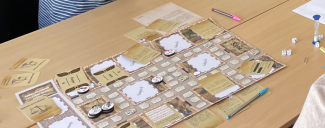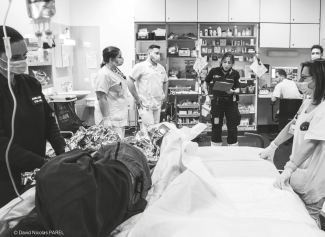Overview
Background
Interest in Digital Learning Games (DLGs) has flourished at all levels of education. They are effective tools to support learner centered teaching practices. However, the design, development and uses of DLGs remain an issue due to the gap between teachers, game developers and researchers.
Project Goals
The goal of the co.LAB project is to improve the design, development and uses of Digital Learning Games. This goal will be achieved by the development of a collaborative methodological framework associated with a collaborative digital platform dedicated to co-design, co-development and co-evaluation of DLGs.
Research questions (RQ)
- RQ1: What methodology is needed to support collaborative DLG design and development?
- RQ 2: What are the digital platform features necessary to support the collaborative DLG design and development process?
- RQ 3: What are the effects of the methodology and digital platform on development cost and duration (efficiency)?
- RQ 4: What are the effects of the methodology and digital platform on the quality of DLGs produced (relevance and effectiveness)?
- RQ 5: What are the drivers for adoption of the methodology and digital platform by the educational, game developer, and research communities?
WorkPackages
WP1: Design of the Methodological Framework
WP 1 aims at design of the methodological framework, with guidelines, tools and recommendations for the co-design, co-development and co-evaluation of DLGs.
WP2: Development of the Collaborative Digital Platform
Based on the results of WP1, development of the digital co-design platform, improvement of the co-development platform and development of the evaluation and dissemination modules. The co-development platform will be built on top of the existing open-source Wegas platform.
WP3: Tests in Naturalistic Contexts
Development, use and assessment of two use-cases of DLGs. Tests will involve all stakeholders of the project: game developers, teachers, students, and educational researchers.
The two tests DLGs will be selected based on our previous experiences and partnerships: Evolution of the “Computational thinking game” at secondary school, new game in medical education at the University of Applied Sciences.
Results will include the developed serious games and a report with an evaluation of the quality of the games, an evaluation of the collaborative process and recommendations for the improvement of the methodology.
WP4: Dissemination
Dissemination of project results to target audiences, through online availability, publications in peer reviewed conferences and journals, presentation in professional conferences and seminars.
Latest News
Game-Based Learning Weeks in Fort-de-France

Retrospective on the EIAH2023 workshop

At the West Switzerland Emergency Medicine Day

